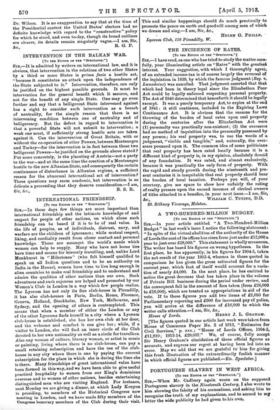THE INCIDENCE OF RATES.
[TO THE EDITOR OF THE "SPECTATOR."]
SIR,-1 have read, as one who has tried to study the matter care- fully, your illuminating article on "Rates" with the greatest interest Your suggestion, with which I thoroughly agree' , of an extended income-tax is of course largely the reversal a the legislation in 1839, by which the famous judgment (Beg. v; Lumsdoine) was annulled. That judgment asserted that that which had been in theory legal since the Elizabethan Poor Act could be legally enforced respecting personal property. The Act of 1840 determined that henceforth it should be legally exempt. It was a purely temporary Act, to expire at the end of 1841: it still continues, included in the Expiring Laws Continuance Act. It is obvious that the reasons for the throwing of the burden of local rates upon real property during the centuries after the Elizabethan Act were (1) personalty was practically non-existent; (2) the overseers had no method of inquisition into the personalty possessed by any person ; his real property was, to use the words of .a judgment, "visible and tangible," and, naturally, the over- seers pounced upon it. The common idea of some politicians that real property has been rated locally because it is a different kind of property is, in my opinion, absolutely devoid of any foundation. It was rated, and almost exclusively,' because it was practically the only form of property. With the rapid and steady growth during the nineteenth and pre- sent centuries it is inequitable that real property should bear the burden of local taxation. Perhaps you will, of your courtesy, give me space to show how unfairly the rating of realty presses upon the earned incomes of clerical owners of tithe attached to a benefice, in your next issue.—I am, Sir,
WILLIADI C. TIITING, D.D.
St. Sithney Vicarage, Helston.














































 Previous page
Previous page